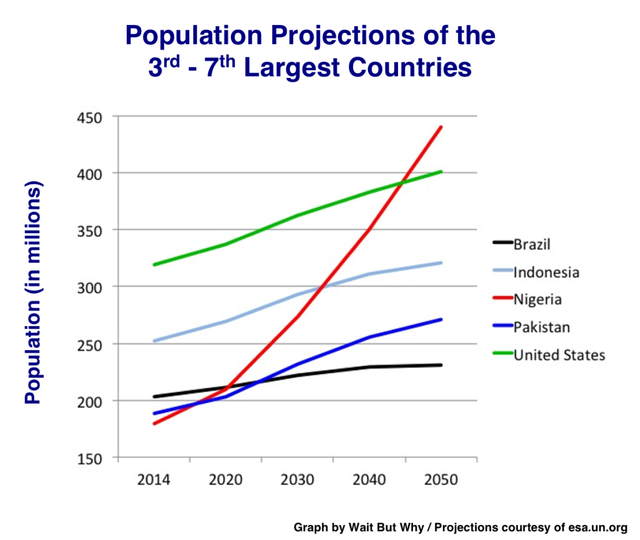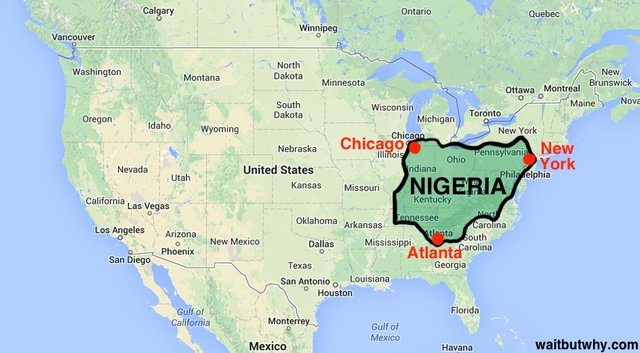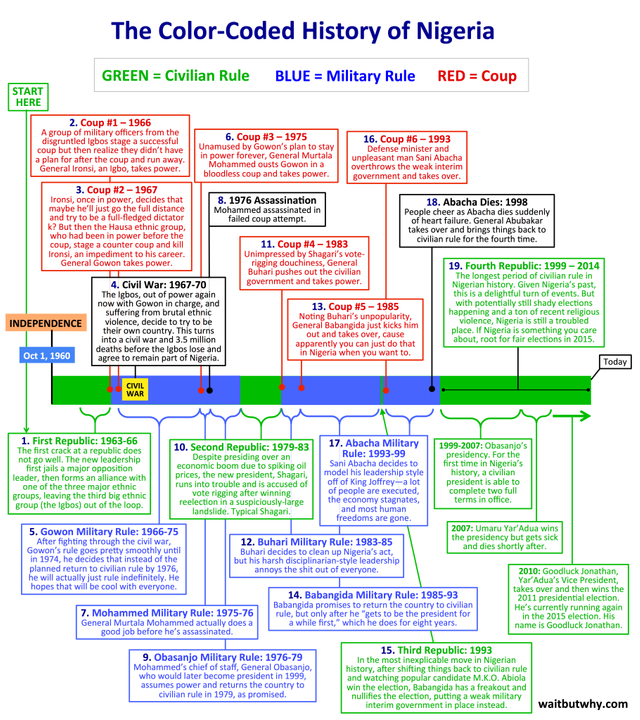THINGS TO KNOW ABOUT NIGERIA>> GIANT OF AFRICA
People:
Nigeria has a lot of Nigerians in it. So many (179 million) that if you took half of them out of the country, Nigeria would still have the highest population of any African country. There are more people in Nigeria than there are in the UK, France, and Spain combined, and 1 out of every 7 black people on the planet is a Nigerian.
Nigeria is pretty parallel to Pakistan in terms of land area, population size and population density, and Lagos, Nigeria’s mega-metropolis, is the world’s fourth largest city, comparable in population and density to Mumbai, Seoul, and Jakarta.
Nigeria also has a really young population—with a median age of 18.2, half of all Nigerians are kids 17 and under, which means that if Nigeria’s kids decided they were over it one day and formed their own country, it would be the biggest nation in Africa, and the most annoying. Combine that with one of the world’s highest fertility rates (5.25 children born/woman), and you have a rapidly growing population. Currently #7 on the country population list, by 2050 Nigeria is projected to have 440 million people and have leapfrogged up to #3 on the list, behind only India and China:

But it’s not a simple situation. All of these people are Nigerians, but really, they’re 250 different ethnic groups, speaking 510 different languages, with a British-drawn border around them. Kind of asking for trouble.
And health is a major struggle—Nigeria has the world’s 10th highest rate of infant mortality, the world’s 12th shortest life expectancy (52.6), and 3.1% of Nigerian adults have HIV/AIDS.
Religion and Ethnicity: Nigeria is one of those tricky countries that’s about half Muslim and half Christian, and while most of the population is fine with this, religious extremists create a lot of violence and ruin everything. And then there are those 250 ethnic groups, the three largest of which comprise 68% of the population—Hausa in the north (mostly Muslim), Igbo in the southeast (mostly Christian), and Yoruba in the southwest (Muslim and Christian)—and these three groups’ general annoyance with each other is behind much of the country’s violent past and political instability.
Land: Nigeria is the world’s 32nd largest country in terms of land area, or about two Californias. On top of the US, it could encompass New York, Chicago, and Atlanta:

Economy: With a nominal GDP of just over half a trillion, Nigeria has Africa’s largest economy, mostly due to its huge oil reserves—it’s the world’s 8th largest exporter of crude oil. But with a profoundly corrupt government, that wealth isn’t doing very much for the people—the infrastructure’s a mess, 24% of adults are unemployed, and two out of three Nigerians live in extreme poverty. Nigeria’s median per capita income of $493 means that a Nigerian who makes $10/week is in the top half of wealth in the country.
History in One Diagram:
The area known today as Nigeria has been home to a bunch of ancient civilizations for over 10,000 years, and in the late 19th century, the British got their tentacles involved during a period of hot European competition over spheres of influence in Africa. The area became a British protectorate in 1901, and today’s Nigeria borders were drawn in 1914. After World War II, the Nigerians were super into the British leaving, which they finally did in 1960 after setting Nigeria up with a new, representative government (which today is a federal presidential republic modeled after the American system).
So 1960 marks the first year of independent Nigeria, and also the beginning of what I can only call The Nigeria Coup Festival, a 50-year devastating struggle to gain stability and democracy.
If you’re really interested in learning about The Nigeria Coup Festival, this is a well-done 2.5-hour documentary about the history of modern Nigeria. For those who are just kind of interested, I spent a quarter of my living years gathering the highlights into the below diagram. Those who are almost entirely uninterested in Nigeria’s history should just count the big red coup dots in the timeline and understand that things have sucked. The image moves forward chronologically using the blue numbers, and you can click on the diagram to see a larger image.
